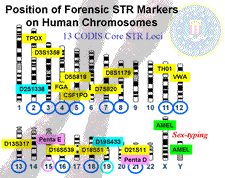Aviso de archivo
Esta es una página de archivo que ya no se actualiza. Puede contener información desactualizada y es posible que los enlaces ya no funcionen como se pretendía originalmente.
Home | Glossary | Resources | Help | Contact Us | Course Map
In the United States, the Federal Bureau of Investigation (FBI) bears the responsibility for maintenance of the national DNA database. The FBI worked with the relevant scientific communities to identify appropriate markers for STR DNA analysis. The European Network of Forensic Science Institutes (ENFSI) performed a similar role in Europe.
The steps involved in the selection of loci are:
- Identify loci that have been published and characterized and are not linked (see Population Genetics & Statistics, Population Theory)
- Select the best candidates for use in forensic science.
- Run numerous population database samples to establish discriminating power (see Forensic Biology, Testing of Bodily Fluids and Tissues) and population frequency data.
- Conduct method development (e.g., multiplex kits).
- Conduct validation studies.
The selection of a core set of loci by the forensic science community must include consideration of method development. Multiplex systems are complex, and while certain loci may be more desirable than others, loci are selected based on their suitability in a multiplex system and their discriminating power.
Currently, a few manufacturers develop STR multiplex kits for mainstream forensic science use. Historically, the manufacturers and the forensic science community have collaborated to develop suitable end products. This has greatly benefited the forensic science community because it is unlikely that these laboratories would be able to devote the resources required for multiplex method development.
Additional Online Courses
- What Every First Responding Officer Should Know About DNA Evidence
- Collecting DNA Evidence at Property Crime Scenes
- DNA – A Prosecutor’s Practice Notebook
- Crime Scene and DNA Basics
- Laboratory Safety Programs
- DNA Amplification
- Population Genetics and Statistics
- Non-STR DNA Markers: SNPs, Y-STRs, LCN and mtDNA
- Firearms Examiner Training
- Forensic DNA Education for Law Enforcement Decisionmakers
- What Every Investigator and Evidence Technician Should Know About DNA Evidence
- Principles of Forensic DNA for Officers of the Court
- Law 101: Legal Guide for the Forensic Expert
- Laboratory Orientation and Testing of Body Fluids and Tissues
- DNA Extraction and Quantitation
- STR Data Analysis and Interpretation
- Communication Skills, Report Writing, and Courtroom Testimony
- Español for Law Enforcement
- Amplified DNA Product Separation for Forensic Analysts


